Make your own baby oatmeal with rolled oats for babies 4-6 months using this easy recipe, plus how to step it up from oatmeal cereal to regular oatmeal as baby gets older and healthy flavoring ideas.
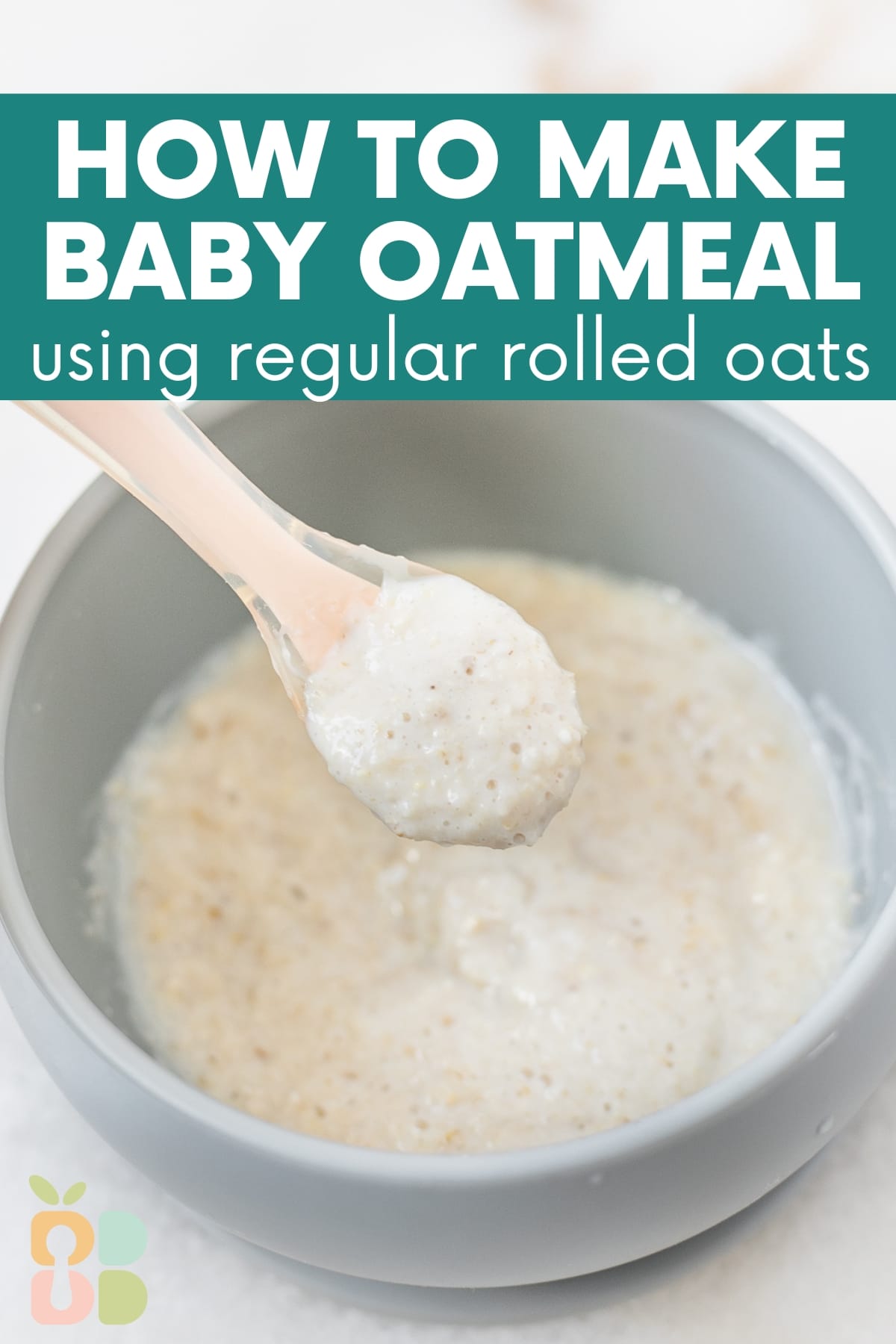
Oatmeal is one of my go-to breakfasts, so naturally, I made it for my kids when they were babies many days, too. I love oatmeal for babies because it's incredibly nutritious, affordable, and so easy to prepare. If you've got a little one just starting solids, you can skip the expensive store bought oatmeal cereal and make your own baby oatmeal for eaters as young as 4-5 months (or when your pediatrician clears you to start solids), and gradually step it up to the oatmeal the whole family enjoys. I'll show you how!
Jump to:
- Why Make Baby Oatmeal?
- How To Make Baby Oatmeal
- Homemade Baby Oatmeal Cereal (4-5 + months)
- Quick Oats for Baby (6+ months)
- Rolled Oats for Baby (6+ months)
- Storing Leftovers
- Baby Oatmeal Add-Ins
- Is Oatmeal Healthy For Babies?
- Top Tips for Baby Oatmeal
- More Baby Oatmeal Recipes
- Baby Oatmeal Recipe with Rolled Oats
Why Make Baby Oatmeal?
Oatmeal is a great, nutrient-dense first food for babies! Homemade oatmeal cereal will be fresher, less expensive and taste better than store-bought versions. It's also made with one simple ingredient you probably already have in your pantry - rolled oats! Baby oatmeal is a better, more nutritious option than rice cereal, IMO.
Read More: Can I Skip Rice Cereal?
How To Make Baby Oatmeal
Ingredients
To make oatmeal for all ages, all you'll need are rolled oats (also called old fashioned oats) and water or milk. You can also choose to use breastmilk if you have extra, or just thin it out with breastmilk after cooking.
PS: If your using a BLW approach, I have a whole post on Oatmeal for Baby Led Weaning!
Homemade Baby Oatmeal Cereal (4-5 + months)
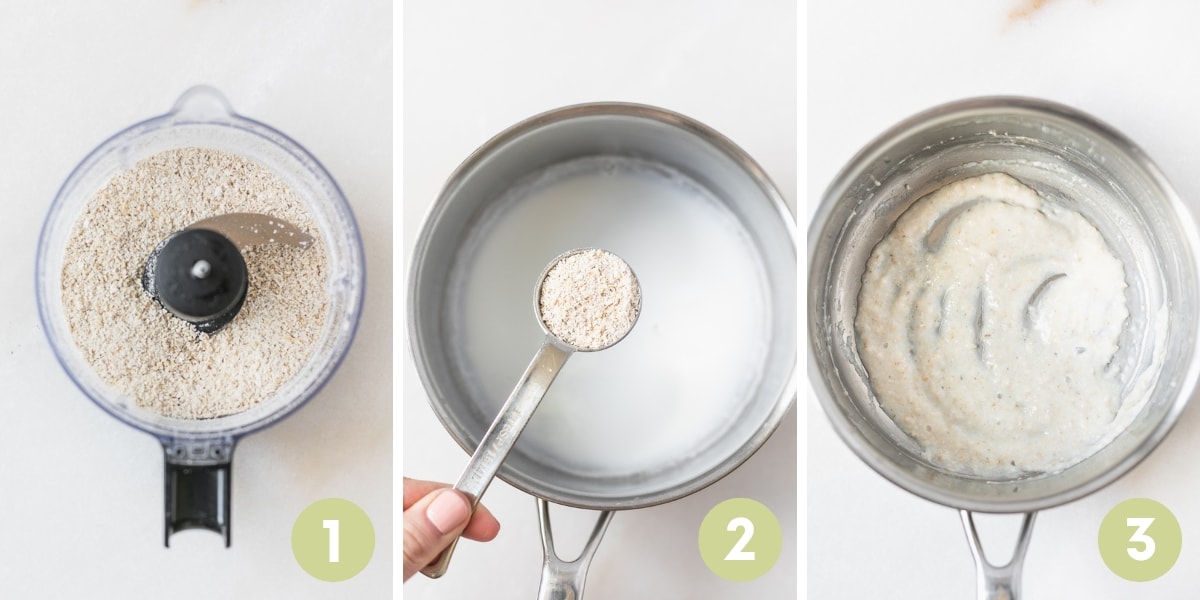
Stovetop Method
- In a blender or food processor, blend oats until you have a fine powder. You can do ½ cup to 1 cup at a time so that you have some already made for later.
- In a saucepan, bring ¼ cup water or milk (or a mix of both) to a simmer. Stir in 1 tablespoon of the ground oats.
- Cook over low for 3-5 minutes, stirring, until the oatmeal is creamy. Add more water or milk as needed to thin it oat to the consistency you need.
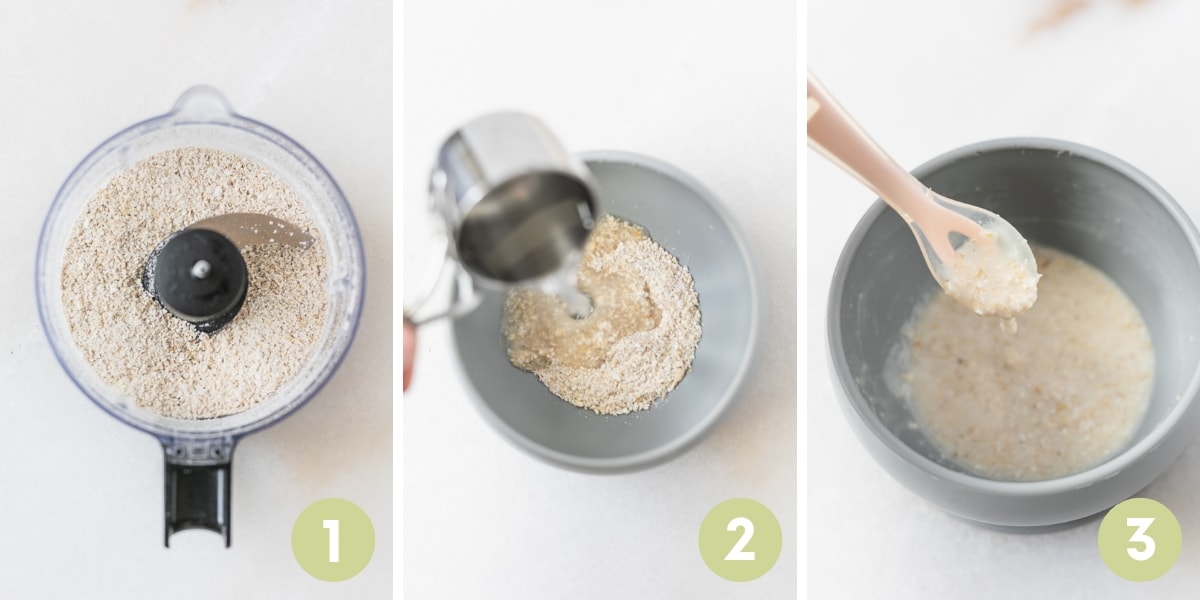
Hot Water Method
- Blend oats in a food processor or blender as above.
- Add 1 tablespoon of the oat powder to a bowl.
- Stir in 2-3 tablespoon of hot water or milk (I like to use a kettle to heat the water). Keep adding liquid as needed until you have the consistency you need.
Tip: If you're in Stage 1, make sure the oats are very finely ground and use more water or milk. For Stage 2, the oats can be ground a little more coarsely and you can make it thicker with less water or milk.
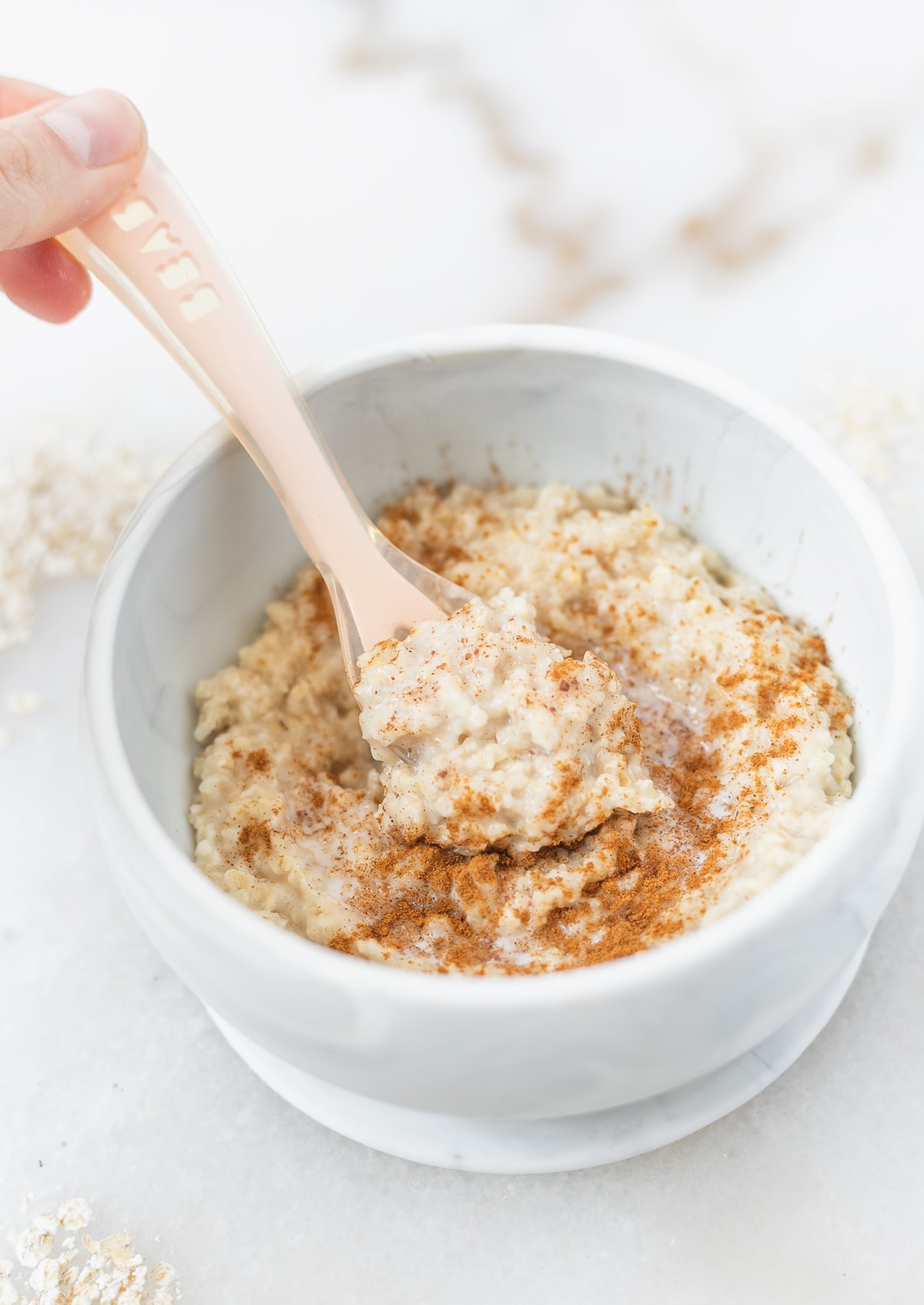
Quick Oats for Baby (6+ months)
For traditionally weaned babes, quick oats can be a great transition from baby oatmeal cereal to regular rolled oats. They are pre-cooked, dried, and rolled thinner than regular rolled oats and cook faster. You can make them on the stovetop or using the hot water method (one of my favorites for babies).
Hot Water Method
- Add ¼ cup quick or instant oats to a bowl.
- Heat ⅓ cup water, milk, or breastmilk to a boil or near-boil. Pour over oats in the bowl.
- Cover the bowl and let stand until the oats absorb the liquid, about 3-5 minutes.
- Stir and adjust consistency with more milk or water as needed.
Stovetop Method
- Bring ½ cup water, milk, or breastmilk to a simmer in a small saucepan.
- Add ¼ cup quick or instant oats and stir.
- Simmer until oats have absorbed all the liquid, about 1-3 minutes, adding more liquid if needed.
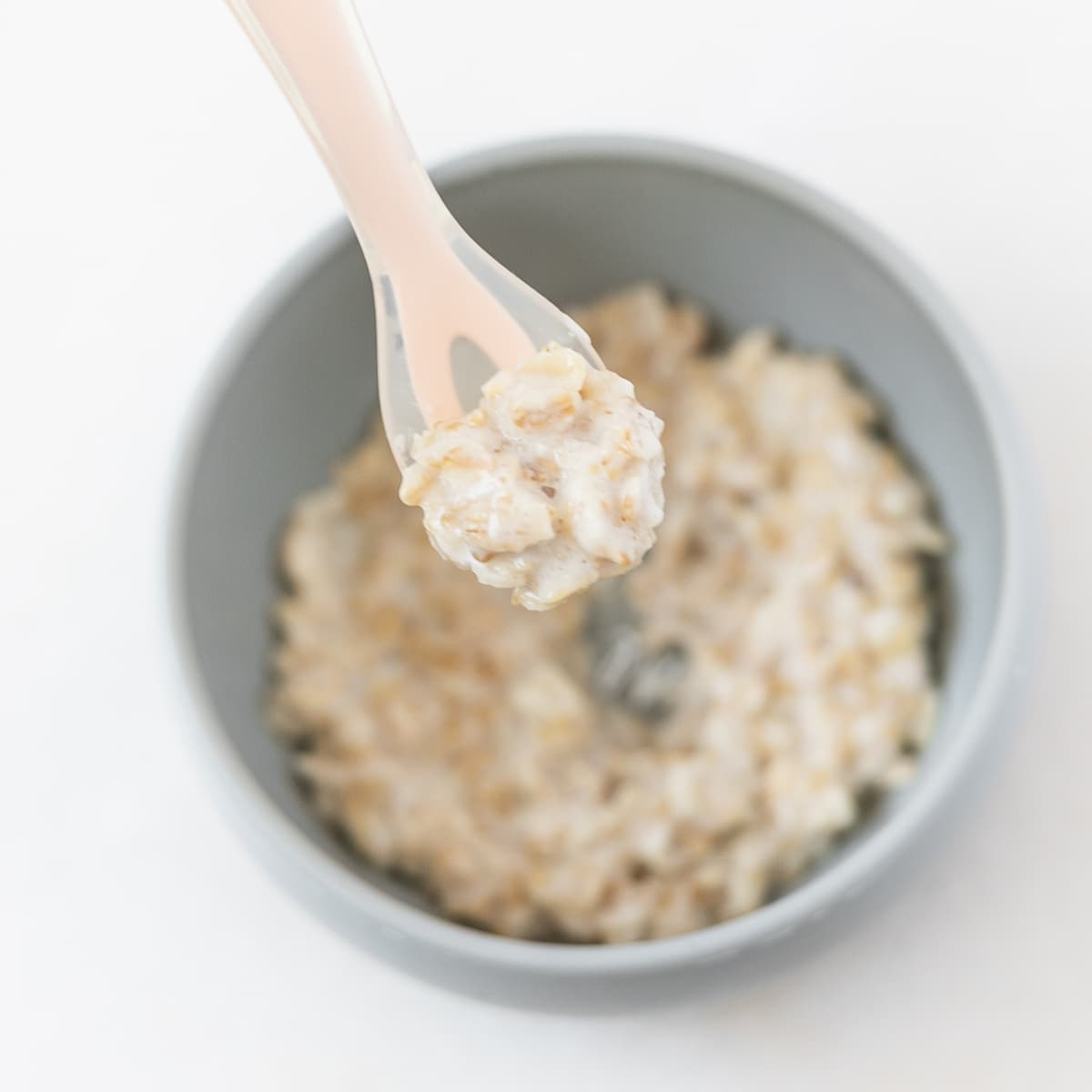
Rolled Oats for Baby (6+ months)
Once your baby is ready for regular oatmeal, you can make it just like you would make yours (just be sure to leave out the added sugar or any choking hazards). This is for one baby serving, so increases it if you want more for other family members or leftovers. This oatmeal is also great for BLW.
- Bring ½ cup water, milk or breastmilk to a simmer in a small saucepan.
- Stir in ¼ cup rolled oats. Simmer gently until oats have absorbed all of the liquid, about 3-5 minutes, adding more liquid as necessary.
Storing Leftovers
Store any leftover oatmeal in an airtight container in the refrigerator for up to 3 days. Reheat in the microwave or on the stove, adding more liquid as needed, as it will thicken when it cools.
You can also freeze leftover oatmeal in silicone freezer blocks for easy portioning for later. Just pop out the frozen blocks and store in a freezer bag, and take one or two out as needed!
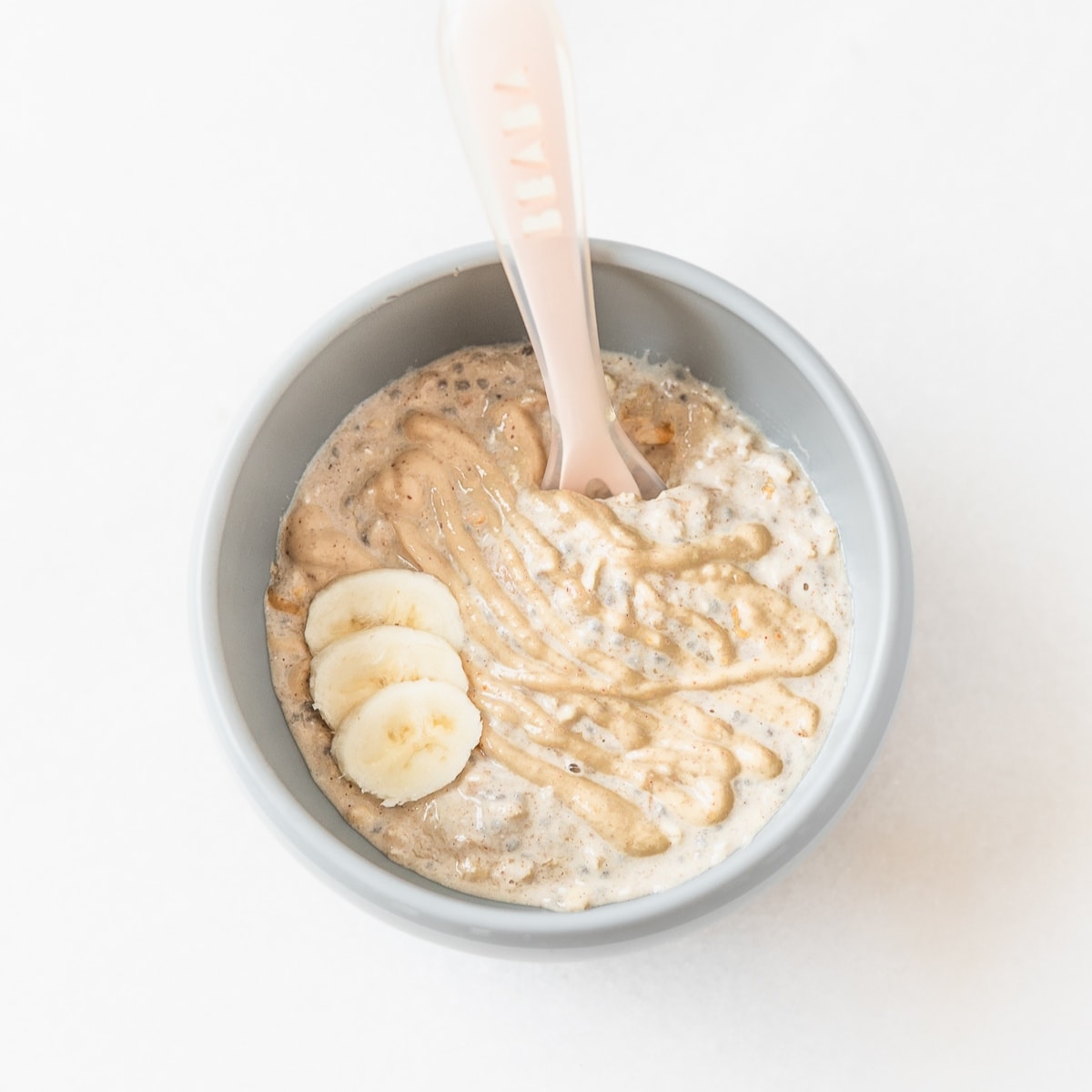
Baby Oatmeal Add-Ins
You don't have to feed your baby plain, boring oatmeal. Oatmeal is so great because it's a blank canvas for nutrient-dense mix-ins and new flavor combinations. It is also a great way to increase allergen exposure with mix-ins like nut butter, egg, or yogurt. Here are a few ideas of things to mix into baby oatmeal for added nutrition and flavor.
- Plain Greek yogurt
- Smooth peanut butter or other nut butter, or peanut butter powder
- Beaten egg or egg white (stir into piping hot oats after cooking)
- Seeds - ground flaxseed, chia seeds, hemp seeds, or sesame seeds
- Prune puree or pear puree - great for helping with constipation!
- Other fruit purees, such as peach or berry
- Mashed banana or applesauce
- Pumpkin or butternut squash puree
- Spices - cinnamon, nutmeg, ginger, cardamom, turmeric, etc.
Is Oatmeal Healthy For Babies?
Oatmeal is a great choice for babies of all ages. Oats are loaded with nutrients, including protein, fiber, healthy fats, vitamins, minerals, and bioactive compounds, which make oats a functional food with health benefits for all ages.
Oatmeal is also rich in fiber, both soluble and insoluble, including a special type called beta-glucan, making it a great food for relieving constipation in babies! This special fiber is good for baby's gut health and anti-inflammatory, too.
Beneficial Nutrients In Oatmeal:
- Protein
- Healthy Fat
- Fiber, including powerful beta-glucan
- Zinc
- Iron
- Manganese
- B-vitamins
- Phenolic compounds
Top Tips for Baby Oatmeal
- Add more liquid as needed to get the consistency for your baby's eating ability.
- Some people don't feel comfortable with using cow's milk for babies. I am fine with using it for cooking foods like oatmeal for babies. (Read more on that here.)
- To make organic oatmeal use organic rolled oats.
- To make gluten-free oatmeal, use certified gluten-free oats.
- Babies can also have steel-cut oatmeal if that's what your family enjoys. Just make sure they are at the appropriate stage for lumpy foods.
- As oatmeal cools, you'll notice is sticks together. Feel free to serve cold oatmeal as a finger food! You can even roll it into balls that baby can pick up more easily.
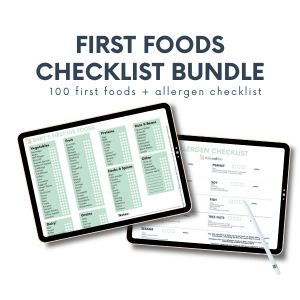
Track your baby's journey through starting solids! Get my 100 First Foods Checklist and Allergen Checklist Bundle today!
Baby Oatmeal Recipe with Rolled Oats
Make your own healthy baby oatmeal with rolled oats using this easy recipe for 4-6 months.
- Prep Time: 5 minutes
- Cook Time: 3 minutes
- Total Time: 8 minutes
- Yield: 1 baby serving 1x
- Category: breakfast
- Method: stovetop
- Cuisine: baby/toddler
Ingredients
- 1 tbsp ground rolled oats
- 2-4 tablespoon water, milk or breastmilk
Instructions
- Grind the oats. Using a food processor or high speed blender, blend ½ cup of rolled oats until you have a fine powder. You'll use 1 tablespoon for one baby serving, and you can store the rest for later.
Stovetop Method
- Bring ¼ cup (4 tbsp) water or milk to a simmer in a small saucepan.
- Add 1 tablespoon oat power and cook over low heat, stirring, until oatmeal is creamy, about 3-5 minutes. Add more liquid as needed to thin to your desired consistency.
Hot Water/Milk Method
- Add 1 tablespoon oat powder to a small bowl.
- Add 2-3 tablespoon hot water or milk and stir until smooth, adding more liquid as needed to thin to your desired consistency.
Notes
- This recipe will make 1 small baby serving. Increase the amount as your baby's belly can hold more food!
- If you're in Stage 1, make sure the oats are very finely ground and use more water or milk. For Stage 2, the oats can be ground a little more coarsely and you can make it thicker with less water or milk.
- Once your baby progresses from thin purees, you can make quick oats or regular rolled oats.
- Some people don't feel comfortable with using cow's milk for babies. I am fine with using it for cooking foods like oatmeal for babies. (Read more on that here.)
- Add flavor and nutrients with fruit purees, mashed banana, smooth nuts butters, and/or spices. Just leave out any added sugar or choking hazards!


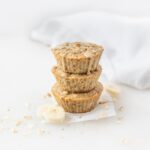
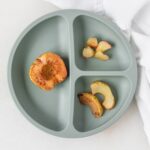
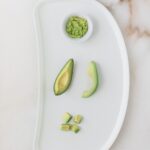
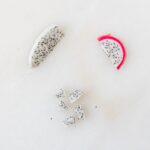
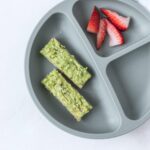
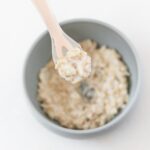
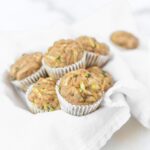


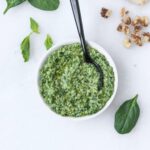





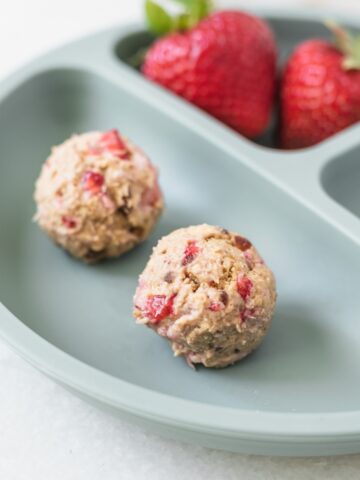
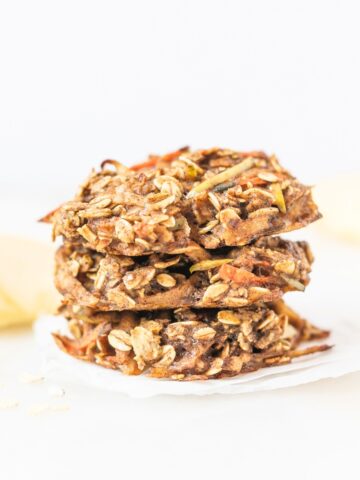
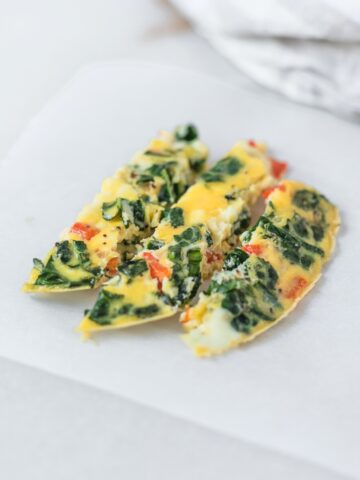
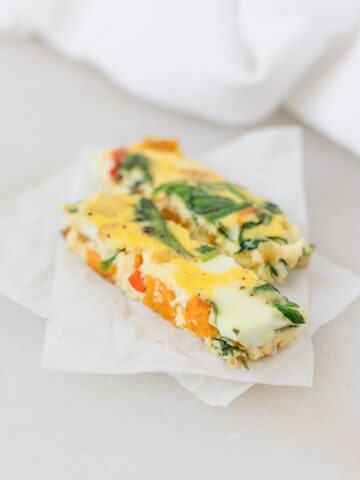
Leave a Reply